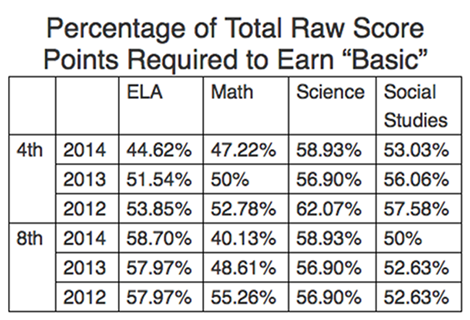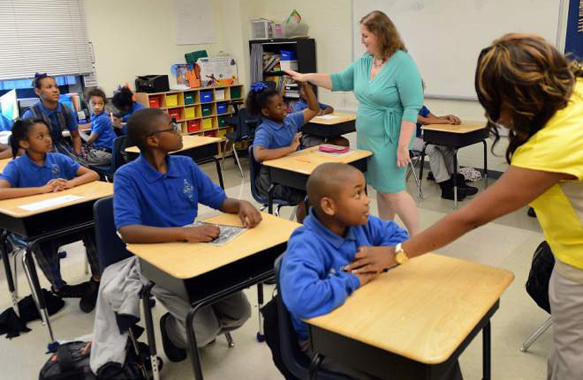Photograph; Arthur Ashe, an independent charter school in the state’s Recovery School District, students prepare for LEAP exams. | Advocate staff photo By John McCusker
Introductory Essay By Raynard Sanders, Ed.D., an Educator, a former John McDonogh School Principal and a New Orleans resident
For years the Louisiana Department of Education and reformers have misled the public on the academic performance of public schools. Each year they announce “unprecedented gains” on annual standardized tests. Of course each year their claims or proven wrong by external analysis of the test scores.
In the “Louisiana Educational Assessment Program (LEAP) Scores Manipulate”
'It turns out that the number of correct answers required for a passing score (or a level of basic) was significantly reduced for three out of four categories of the LEAP high stakes testing.'
Louisiana Educational Assessment Program (LEAP) Scores Manipulated
Public Records Request Reveals Significant Lowering of the 2014 LEAP Passing Requirement
After more than 2 months of stalling by the LDOE, I received an email from Barry Landry of the LDOE on August 14 providing me with the minimum percentage scores needed for students to pass the ELA and math portions of the 2014 LEAP test for 4th and 8th grades compared to previous years. The LDOE has still not provided me with the cut percentages for the mastery ratings I requested. Coincidentally, my lawsuit on this violation of the public records law was also filed Thursday, August 14. It is my hope that the court will order John White to also produce the minimum percentage results for the mastery level rating. The press release referred to above announced that more students were achieving a level of mastery in ELA and math than the year before. I am anxious to examine the basis for that alleged improvement. Meanwhile, the suspicions expressed in my post of July 27, have been confirmed.
It turns out that the number of correct answers required for a passing score (or a level of basic) was significantly reduced for three out of four categories of the LEAP high stakes testing. Once one knows how the passing scores are routinely manipulated it’s no surprise that the percentage of students scoring basic or above remained steady. The test grading scale for LEAP was adjusted or “equated” (to use the lingo of testing experts), apparently to make certain that the perceived performance of students on the new Common Core aligned tests remained steady.
For example, in 2013, 4th grade students taking the ELA test needed to get 51.54% of the answers correct in order to get a scale score of 301 for a level of basic, but in 2014, after the annual “equating of test forms”, students only needed to get 44.62% of the answers correct in order to get the minimum scale score of 301 needed for the level of basic. So the members of general public who don’t know the obscure workings of the testing industry, were given the impression that students did just as well on a harder test. But this only happened because students got a rating of basic on the 2014 ELA test by answering fewer questions right. The excuse used by the LDOE and the testing company for lowering the percent of correct answers needed is that since this year’s test was harder, an equating calculation was applied which resulted in a lower percent of correct answers needed for passing. Okay, we get the picture. But you can’t have it both ways. If you lowered the cut percentage score to adjust for the harder test, then you can’t claim that the students performed just as well on the more difficult test!
There is another issue here in setting these cut scores in this manner that begins to strain credibility. It is well known that on a multiple choice test with 4 choices, a student who knows absolutely nothing can get 25% correct answers just by guessing. Teachers who prepare these kids for their tests advise them to guess at any questions they do not know so as to maximize their score. But the lower the equated cut percentage gets, the more that guessing can figure into the passing score. For example on this ELA example above, Herb Bassett (a highly qualified math teacher), calculates that a student could pass on the average by just really knowing only 26.2% of the material and getting the rest of his right answers by guessing. So is this where the new Common Core standards are taking us? Is it really a rigorous standard when a student can get a passing score in English Language Arts by knowing only 26% of the material.
Here is the table supplied by the LDOE as a result of my public records request:

Notice that for 4th grade ELA, 4th grade Math, and 8th grade Math, there was a significant lowering of the percentage of correct answers needed to get a rating of basic. The Science and Social Studies percentages were changed very little from 2013 to 2014.
Would you like to know why such a high percentage of our students (64%) were able to reach the level of Basic this year on a more difficult 8th grade Math test? Herb Bassett calculates that using the same method of guessing described above, 8th grade students this year on the average would need to know only 20.2% of the math material on the test to reach the level of Basic.
John White has said he is certain that our student test scores will improve steadily as Common Core is implemented in the next few years in Louisiana. I wonder how he knows that? Readers this is a test of your critical thinking skills. How do you think John White knows that our percentage of basic and mastery level students will go up in the next few years? Please send me your comments on this.
Here is a post recommended by Diane Ravitch about how the New York testing scores are being manipulated. Do you get the feeling, as I do, that we are all being taken for a ride by the con men of the testing industry and our “Rainmaker” superintendent borrowed from New York? Is there any validity to the claim that the new Common Core tests are more “rigorous” than the old standards if the testing company systematically lowers the cut score percentages to a level so low that students can come close to passing by guessing?
We know only one thing for sure about adopting new standards and this constant testing and “test equating”. As long as we allow our children’s education to remain in the grip of the testing companies and the corporate reformers, those companies will continue to make millions off of our students and taxpayers.
Michael DesHotels is a retired Louisiana educator who taught science at the secondary level. I also served in various positions with the Louisiana Association of Educators culminating in the position of Executive Director prior to my retirement.












Leave A Comment